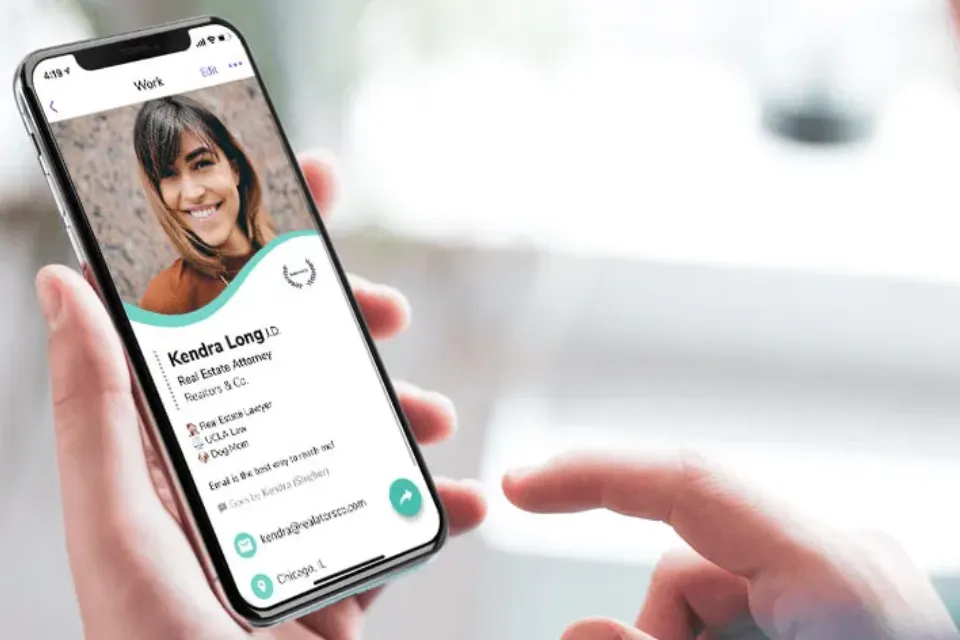In the dynamic landscape of the commercial realm, the significance of networking has become increasingly pronounced. For several years, the conventional practice of utilizing paper business cards as a means to communicate contact information and foster professional connections has been widely prevalent. However, as technology advances and environmental concerns grow, digital business cards have emerged as a sustainable, efficient, and highly versatile alternative.
1. Benefits of Digital Business Cards
1. Accessibility

Unlike physical cards, which can be misplaced or forgotten, digital business cards can be stored on smartphones, tablets, or cloud services. This level of accessibility ensures that one’s networking information is readily available when needed, enhancing the chances of meaningful connections.
2. Data Analytics and Insights:
Digital business card apps and platforms often provide data analytics on how recipients engage with the shared information. Users can track who viewed their card, which links were clicked, and when the card was accessed. This data can be valuable in identifying the most interested contacts and tailoring follow-up interactions.
3. Global Reach:

Digital business cards transcend geographical boundaries. They can be easily shared with international contacts, which is particularly beneficial for businesses or professionals seeking global connections. This expands networking possibilities far beyond what traditional business cards can offer.
4. Advanced Search and Organization:
Digital business card applications often include search and organizational features, making it easier to find specific contacts in a vast network. Users can categorize and tag contacts, simplifying the process of reaching out to the right people at the right time.
5. Instant Sharing:

Sharing digital business cards is a straightforward and instant process. It can be done via email, messaging apps, or even through Near Field Communication (NFC) technology, where two smartphones are simply tapped together to exchange contact details. This speed of sharing enhances the efficiency of networking interactions.
6. Personalization and Branding:
Digital business cards allow for a high degree of personalization. Users can choose fonts, colors, and designs that align with their personal brand or the image they want to project. This ability to tailor the card’s appearance enhances the chances of creating a memorable impression.
7. Security and Privacy:
Digital business cards often come with privacy controls, allowing users to share only the information they are comfortable disclosing. This feature safeguards sensitive data and ensures that only trusted contacts receive certain details, providing a sense of security in networking endeavors.
2. Exploring the Diversity of Digital Business Cards
The traditional paper business card has been a staple of professional networking for decades. However, with the digital revolution, traditional practices are evolving to keep pace with modern trends. Digital business cards have become an innovative and eco-friendly alternative to their paper counterparts. In this essay, we will delve into the various types of digital business cards, exploring the benefits and features they offer for networking and personal branding.
I. QR Code Digital Business Cards
The QR code-based kind of digital business cards are among the easiest to use and most popular. The provided format facilitates the creation of a Quick Response (QR) code that encompasses essential contact information such as the individual’s name, phone number, email address, and website. Upon being scanned by a smartphone or other QR code reader, the contact information is promptly saved to the recipient’s device. The popularity of this format stems from its simplicity and universality, as QR codes can be conveniently scanned using the camera of a smartphone.
Advantages:
Eco-friendly: No paper waste involved.
Easy sharing: Quick and convenient for both parties.
Real-time updates: Information can be changed or updated as needed.
II. Mobile App-Based Business Cards
Mobile apps have revolutionized how we manage and exchange contact information. Several applications offer digital business card functionality, allowing users to create and share professional profiles seamlessly. Some popular options include LinkedIn, CamCard, and Evernote. Users can design digital cards with their personal and professional details and share them within the app or export them as a shareable link.
Advantages:
Detailed profiles: Include not just contact info but also work history, skills, and endorsements.
Network integration: Connect with other professionals directly through the app.
Analytics: Track interactions with your digital card for better insights into your networking efforts.
III. Email Signature Digital Business Cards
For professionals who prefer simplicity, email signature digital business cards offer a straightforward solution. These cards are embedded directly into the user’s email signature. Whenever they send an email, the recipient can see their contact details, job title, and company name at the bottom of the message.
Advantages:
Consistency: Ensures that every email contains updated contact information.
Branding: Reinforces personal and professional branding with every email.
Easy access: Recipients can save your contact information with one click.
IV. Interactive PDF Business Cards
Interactive PDFs provide an engaging and versatile format for digital business cards. Users can create dynamic, multimedia-rich cards that include clickable links, embedded videos, and interactive elements. They can be shared as email attachments or hosted on websites for easy access.
Advantages:
Creativity: Enables the incorporation of multimedia elements for a memorable experience.
Information-rich: Perfect for professionals who want to showcase portfolios, testimonials, or additional documents.
Compatibility: Viewable on various devices and operating systems.
ALSO READ : Revolutionizing Payments With Revolut Cards: A Comprehensive Overview
Conclusion
Digital business cards represent a significant evolution in the art of networking. They offer a sustainable, efficient, and versatile means of sharing contact information and creating lasting impressions. For more information about business cards online or business card design visit the official website of Frontceleb.

